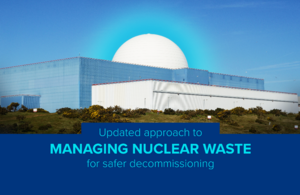Updated approach to managing nuclear waste
Updated approach to managing nuclear waste for quicker, safe decommissioning.

Updated approach to managing nuclear waste
- Focus on innovations in nuclear waste treatment techniques to increase recycling and reduce impact on the environment
- near surface facility could dispose of less hazardous radioactive waste
- measures will allow quicker, safe decommissioning
The UK is today updating its approach to handling nuclear waste and radioactive substances to continue to prioritise safety, the environment and quicker decommissioning.
Changes will encourage innovation in waste treatment techniques – from greater recycling to research into extracting isotopes from nuclear materials for use in diagnosis and treatment of cancers, with the option of disposal made the last resort. This will minimise impact on the environment and help reduce the amount of waste for disposal.
In addition to England and Wales long-term plans to dispose of the most hazardous radioactive waste in a geological disposal facility hundreds of metres underground, the Nuclear Decommissioning Authority will explore using a facility closer to the surface for less hazardous radioactive waste.
While a geological disposal facility is not expected to be ready until the 2050s, a shallower disposal facility – which is up to 200m below ground - could be available within 10 years in England and Wales allowing for quicker decommissioning which will save around £500 million in storage costs. This approach is in line with other nuclear nations including France and Finland.
The framework will also make clear that lightly contaminated rubble and substructures can be disposed of on-site if safe to do so. This will avoid tonnes of waste being bagged up and transported for heavy-duty disposal elsewhere, reducing impact on the environment, with the potential to save a further £500 million over the next 20 years.
Minister for Nuclear Andrew Bowie said:
The UK has been a pioneer in nuclear technology, and now we’re taking sensible steps to manage our radioactive waste, while reducing the burden on the environment and taxpayer.
This will help continue our world-leading nuclear safety record, protect our environment and mean quicker decommissioning of former sites.
Following the example of Hinkley Point C and Sizewell C, which have plans to manage spent fuel on site, new nuclear projects will need to ensure they have a robust plan for decommissioning and managing waste.
It comes after the UK government recently announced the biggest of expansion of nuclear power for 70 years and is exploring building a major new power station as well as rolling out a fleet of Small Modular Reactors in England and Wales.
The most hazardous nuclear waste in England and Wales will ultimately be disposed of deep underground in a facility which safely isolates and contains the waste within rock and protective barriers. Less hazardous waste does not need this hyper-secure isolation and can be more quickly and safely disposed of in near-surface disposal facilities. Like a geological disposal facility, this kind of waste facility never needs people to manage it once it has been sealed and closed.
These changes were consulted on from March to May last year and had input from the public, local government, nuclear industry and regulators.
David Peattie, Chief Executive Officer at the Nuclear Decommissioning Authority, said:
We welcome the updated policy which takes account of the significant innovation and decommissioning experience that has been developed within the NDA group and wider sector, both in the UK and internationally, in recent years.
We’ll work closely with our stakeholders and communities to take forward the opportunities created by this new policy, ensuring that we maintain the highest standards of safety and environmental protection to deliver our nationally important decommissioning mission.
Philip Duffy, Chief Executive of the Environment Agency, said:
As one of the UK’s independent nuclear regulators, we have worked closely with government on today’s announcements which we welcome. It is important that the right infrastructure is in place to manage radioactive waste in a way that protects the environment and public health.
We will be working in partnership with our fellow regulators to ensure that this risk-led approach is overseen by robust regulation.